COVER STORY
Fast Forward Sri Lanka
Aruni Wijewardane represents Sri Lanka at global fora, shaping diplomatic discourse with grace and expertise. She embodies the nation’s voice on the world stage, fostering dialogue and collaboration in international arenas.
Wijewardane is a distinguished career diplomat with over 35 years of dedicated service to Sri Lanka’s foreign service.
Throughout her career, she has held pivotal positions within the Ministry of Foreign Affairs, including serving as Additional Secretary to the United Nations and Multilateral Affairs Division, Director General for the West Division, Director for both the South Asia and SAARC Division, as well as the Economic Affairs Division.
Her extensive experience also extends overseas where she has represented Sri Lanka with distinction in various capacities. Wijewardane has served as Second Secretary at the Sri Lanka Mission to the UN in Geneva, Deputy High Commissioner at the Sri Lanka High Commission in Malaysia and Deputy Chief of Mission at the Sri Lanka Embassy in the Philippines.
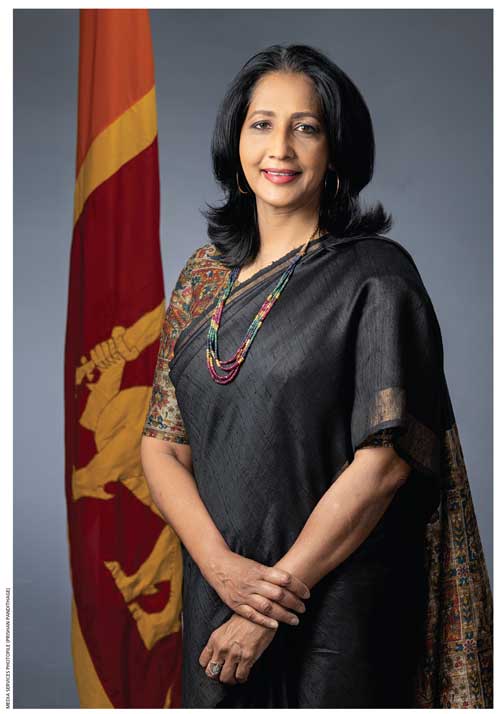
From 2005 to 2008, she was Sri Lanka’s Ambassador to Austria and Permanent Representative to the UN Organizations in Vienna, earning multiple concurrent accreditations.
Beyond her diplomatic roles, Wijewardane holds an MPhil degree from the University of Cambridge where she was a British Chevening scholar. She also holds a master’s degree from the University of Colombo and a BA degree in English literature from the University of Western Australia.
In this exclusive interview, Sri Lanka’s Foreign Secretary Aruni Wijewardane underscores the pivotal shift towards prioritising economic dynamics and spearheading diplomatic efforts to foster sustainable growth.
– Compiled by Tamara Rebeira
I hope that both the government and people of Sri Lanka will learn from the past, in going forward in a manner that is socially, politically and economically sustainable
Aruni Wijewardane
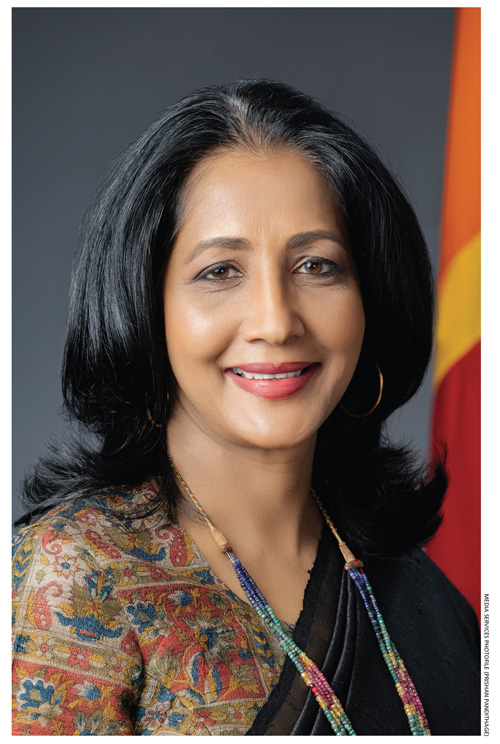
Q: You’re completing two years since being appointed Secretary to the Ministry of Foreign Affairs. What are your priorities in this role – and have they changed or evolved since your appointment?
A: I was appointed Foreign Secretary on 20 May 2022, which was a very turbulent time in the country – socially, politically and economically.
In April of that year, shortly after the pandemic, Sri Lanka announced a sovereign debt default for the first time, and images of instability and crisis in the country were broadcast worldwide.
I recall clearly that my priority at the time was twofold.
Firstly, to communicate to the international community – through the ministry, and our network of 61 missions overseas and to foreign representations in Colombo – our confidence in Sri Lanka’s ability to stabilise and recover from the crisis.
Simultaneously, I put in place the necessary administrative and managerial measures, to ensure continuity of work under extraordinary financial and resource constraints and uncertainty
Today, the situation in the country has recovered due to the orderly democratic transition and corrective economic measures enforced by the government, with the support of the people and the international community. Accordingly, the priorities at the ministry have also evolved.
Our relations with the world are central to Sri Lanka’s recovery from the past crisis, both in terms of ongoing economic and political engagements with the international community, as well as with our discussions with external creditors and international financial institutions.
We are now in a situation of economic stabilisation and moving towards recovery – for this year, we are projecting 1.8 percent growth for Sri Lanka, which is remarkable progress from where we were.
In line with the government’s priorities, we are reorienting the focus of the foreign ministry towards ‘economic diplomacy’ in order to ensure enhanced revenue opportunities for the country and greater integration with the global economy – i.e. through trade expansion, value addition, diversification of products and markets, and investment promotion.
We are engaged in widening trade relations beyond our traditional partners in the West. The ministry is prioritising East Asia and ASEAN – which is where the highest future growth rates are expected – and also reaching out to Africa.
Following recent high-level visits, we have identified areas for more extensive bilateral cooperation with India and China respectively.
With the return of stability, another area we are prioritising is supporting tourism promotion.
The ministry is also prioritising current areas of focus internationally such as financing, just and sustainable climate change adaptation and energy transition including identifying climate financing opportunities; tackling sovereign debt relief, bridging global digital and technological divides, and enhancing the legitimacy and representative nature of multilateral institutions including international financial institutions.
On the management front at the ministry, I emphasise the extra responsibility and effort required from officers of the Sri Lanka Foreign Service (SLFS), despite constraints, for the future recovery of the country. At the same time, it is a priority to enhance the role, contribution, cadre and skills of the SLFS.
As prioritised by the government, we are also opening a number of new overseas missions. In line with the digitalisation policy of the government, we’re digitalising more areas of our work – in particular the consular services, which is the public face of the ministry.
In dealing with the future world, Sri Lanka Foreign Service officers must acquire the required skills for future diplomacy – such as skills in new modalities of social media communications, the use of IT, cyberspace and digital spaces, familiarity with new and relevant actors in the financial, technological and private sectors, the media and civil society.
The foreign service must go beyond traditional approaches of dealing predominantly with state representatives.
I consider it an encouragement and a sign of confidence in the professional expertise of the Sri Lanka Foreign Service that in recent Head of Mission appointments, SLFS officers – men and women – have reached close to 70 percent, which is a huge gain.
Q: You’ve held various positions in Sri Lanka’s overseas missions and international organisations. How have these experiences shaped your perspective on international diplomacy?
A: Both Sri Lanka’s foreign policy priorities and the global environment in which we seek to realise them evolve over time.
During my career, I have experienced many phases of this – for many years in the past, the international aspects of the domestic conflict and countering terrorist propaganda overseas was a key dimension in our foreign relations.
While this still remains important, today in the light of our recent experience, our key focus is on the economic front – and advancing the economic recovery and growth through the ministry’s outreach.
Our foreign policy is an extension of our domestic priorities and interests, taking into account the challenges and opportunities arising from the strategic, geopolitical and economic dynamics of the world.
During my career, there have been major developments in the world such as when the Cold War ended, or unprecedented transnational threats such as climate change or the pandemic occurred or the Ukraine conflict began. As diplomats, we have to identify the challenges and opportunities of these shifting templates to serve the best interests of Sri Lanka.
At the same time, there are certain factors that remain constant in our approach to diplomacy – viz. safeguarding our core national interests such as sovereignty, security and territorial integrity, promoting opportunities for economic prosperity and progress for citizens, and working within a framework of values defined by nonalignment – that is a policy of friendship with all based on non-interference and peaceful relations.
Within this broad framework, it has been my experience that even as a small country, our diplomacy can play a useful and important role in the world.
As Sri Lanka is neutral and doesn’t take sides in power politics, we can help build consensus in polarised situations. Since Sri Lanka doesn’t have global power interests, we can promote values such as equity and justice in international relations. And for this purpose, Sri Lankan diplomats must be considered credible and reliable partners as ‘honest brokers.’
Q: In the context of foreign policy, what are the key challenges and opportunities you foresee for Sri Lanka in the current global geopolitical landscape?
A: Today, the world is going through a period of significant geopolitical – or as some observe, ‘geo-economic’ – transformation.
A number of new economically, politically and technologically significant countries are playing an important role on the world stage.
This has been described as an evolving multipolar world, with new and old aspirants for global leadership vying for influence and friends, providing a larger menu of options and partners for Sri Lanka in the conduct of its foreign policy.
If we take our region, India is home to the globe’s largest population – it is expected to be the fifth largest economy by 2030, and has been identified as the fastest growing economy in the world with a projected growth rate of 6.2 percent in 2024. Following President Ranil Wickremesinghe’s visit to India last year, several new areas of cooperation were identified.
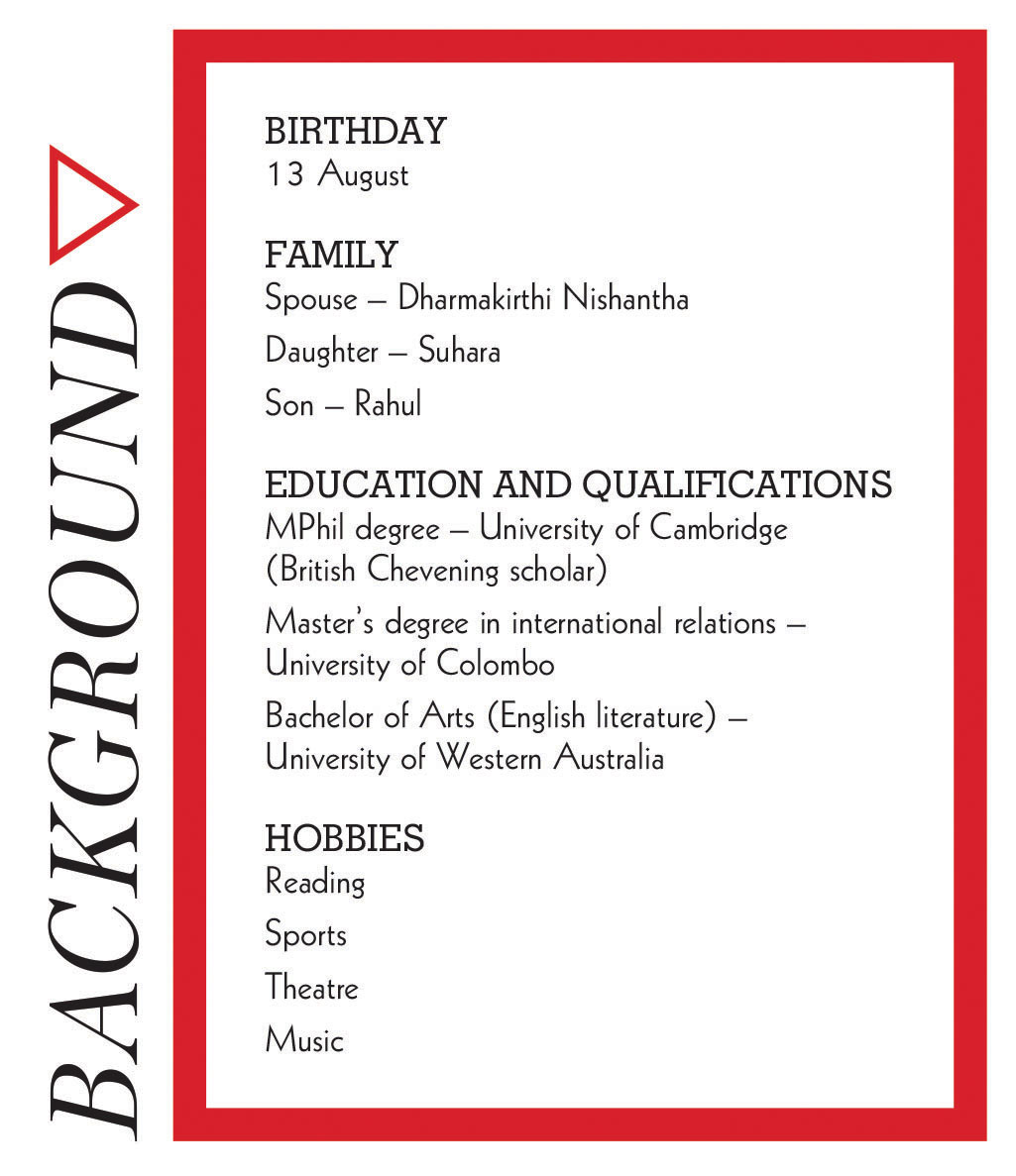
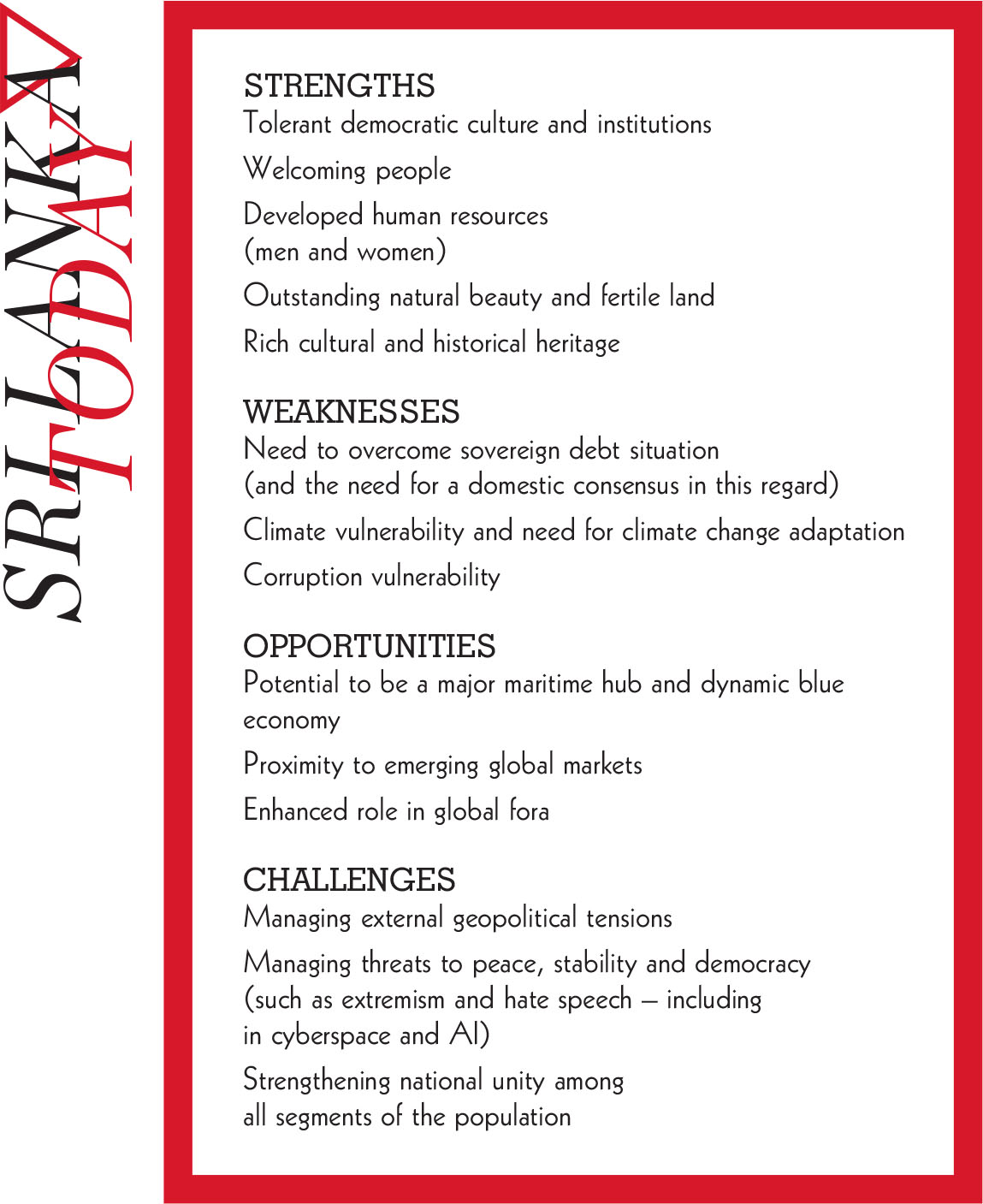
The highest economic growth is expected to take place in East Asia and the ASEAN region – Sri Lanka has sought to benefit in this regard by applying to join ASEAN RCEP – the largest free trade area in the world.
We have also recently signed an FTA with Thailand and we’re about to begin free trade agreement negotiations with Indonesia and China respectively. And we will soon operationalise the FTA with Singapore.
It’s encouraging that several developing countries are projected to be leading economies by 2050. Therefore, we see opportunities in the enhanced significance and recently expanded membership of minilateral groups of developing countries of the Global South such as BRICS (Brazil, Russia, India, China, South Africa) and G20.
China is the second largest economy in the world, and leveraging the economic and infrastructure partnerships we have consolidated through the Belt and Road Initiative (BRI) partnership is a great opportunity. The president concluded bilateral visits this year to China, culminating in a joint statement for enhanced partnership.
A multipolar world brings the opportunity of diversification in many spheres, including new opportunities for trade and investment as post-pandemic advanced economies diversify their production and supply chains.
On the other hand, the current global geopolitical landscape presents several challenges as well.
We see conflicts in Ukraine as well as Gaza (with the risk of widening to the Middle East region), and heightened tensions among big powers in the Indian Ocean. These situations coupled with the pandemic shocks adversely affect the world economy with negative implications for Sri Lanka, which is still in a vulnerable phase of recovery from its sovereign debt default.
These include disruptions to critical maritime and land transport, and food and energy security; as well as price hikes, tightened credit conditions as global GDP growth is projected to slow to 2.4 percent in 2024.
Global free trade will also be affected with the rise in protectionist measures as developed economies seek self-sufficiency or to relocate in the vicinity (near-shoring and friend-shoring) to protect themselves against geopolitical risks and supply chain disruptions at a time when we are seeking increased trade and investment as a strategy to resuscitate our economy.
In addition, extreme climate events have been identified as the single most significant collective threat we face in the future. The post-pandemic global credit crunch will have an adverse impact on financing demands for Sri Lanka’s climate change adaptation ambitions, sovereign debt recovery and financing of Sustainable Development Goals (SDGs).
In a rapidly changing international environment, the president’s intention to review Sri Lanka’s foreign policy – and its related defence, strategic and economic policies – this year is timely.

Q: How do you think Sri Lanka should strengthen and enhance relationships with countries and foreign organisations, given its standing in the eyes of the international community?
A: Given the recent debt and social crises, Sri Lanka’s international image has suffered a setback.
Sri Lanka can strengthen and enhance its relationships in the world by demonstrating tangible signs of recovery from its economic crisis and by taking corrective measures to avoid such vulnerabilities in the future.
We have already demonstrated progress in this regard; and we’re already seeing signs of restored external confidence with the return of tourism, higher remittances, strengthened foreign reserves, support for our debt restructuring programme, high-level exchanges of visits etc.
Several domestic governance measures we have put in place also enhance external confidence – such as the voluntary Governance Diagnostic Assessment (GDA) that we have undertaken with the IMF and the action plan adopted.
Such measures will enhance the long-term confidence of external partners in dealing with Sri Lanka as they’re aimed at reducing future vulnerabilities.
Other measures such as steps taken towards strengthening national reconciliation and unity, as well as enhancing democracy and governance, also serve to increase external confidence in the stability of the country. We have to be predictable, trustworthy and reliable partners; we must play a constructive role.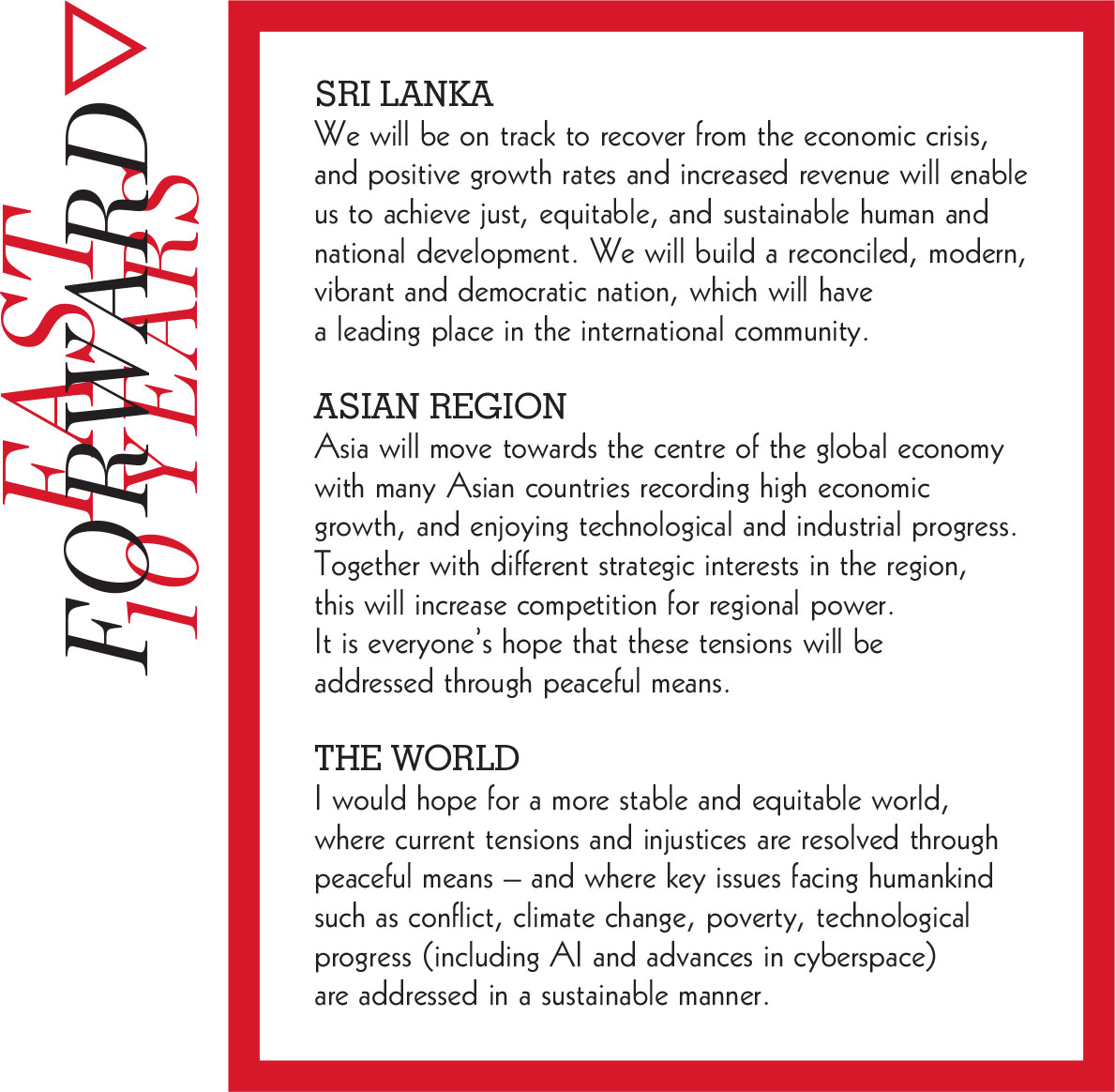
We also continue to actively reach out to new partners while enhancing existing friendships. The last two years saw high level engagements involving countries across the spectrum – including traditional partners like India, China, Japan and Iran, as well as in the Western world.
Our cooperation with the United States continues to flourish particularly in the trade and development sectors, as is evident in the recent US International Development Finance Corporation (DFC) support for Sri Lanka and cooperation mechanisms like Trade & Investment Framework Agreements (TIFAs).
We’re enhancing engagement with the EU too. Recently, I led the Sri Lanka delegation to the Sri Lanka-EU Joint Commission where it was confirmed that the European Union will continue the Generalised Scheme of Preferences Plus (GSP+) trade facility for Sri Lanka.
In addition, we have witnessed renewed friendships like that with France, which saw President Emmanuel Macron visiting Sri Lanka for the first time. We’re also strengthening partnerships with Southeast Asia and Africa, and have sought membership of regional arrangements like the Regional Comprehensive Economic Partnership (RCEP).
We have taken on the chairmanship of the Indian Ocean Rim Association (IORA), given our interest in peace, stability, safety and security, as well as freedom of navigation and a blue economy in the Indian Ocean.
In addition, we have taken an active role in several regional and multilateral (UN, NAM and G77) fora dealing with contemporary issues – for example, sovereign debt and reform of global financial architecture; climate justice and sustainable development; pandemic prevention and vaccine equity; maritime safety and security; financing for development; achievement of SDGs; equitable sharing of global public infrastructure; and digital equity etc.
All of these bilateral, multilateral and regional engagements enhance our image as an active member in the international community, and strengthen relationships with countries and foreign organisations.
Q: Sri Lanka is blessed with a unique geopolitical positioning. How should we leverage this to advance the nation’s interests, and contribute to regional and global stability?
A: Geography and location are considered determinants of foreign policy. Accordingly, our strategic location in the Indian Ocean can advance Sri Lanka’s interests and contribute to regional and global stability.
Our ports are located in close proximity to sea routes connecting the rapidly growing economies of East Asia, and energy rich West Asia continues to play a vital role in keeping critical supply chains active and also serves as a source of revenue.
Enhancing external connectivity through upgrading to a global logistics hub in the ports sector and diversifying shipping markets and ports-related services including transhipment are key elements of our growth strategy. This contributes to enhanced and peaceful economic activity. Our central location as an island is also being leveraged for coastal tourism.
The Indian Ocean Rim Association seeks to promote sustainable and safe use of the ocean for its 23 member states and 10 dialogue partners; and as the IORA chair, Sri Lanka is particularly invested in promoting maritime safety and security, as a means of combatting ocean related transnational organised crime such as human trafficking, drugs and materials for weapons of mass destruction (WMD), as well as promoting a blue economy for the prosperity of all.
We can actively engage in and lead initiatives to address common interests of the region such as climate change, ocean sustainability and maritime cooperation.
The foreign ministry plays a key role in this exercise: Foreign Minister Ali Sabry chairs the IORA Council of Ministers and I will chair the next session of the senior officials meeting in May, here in Colombo.
At a time of heightened geopolitical tensions in the Indian Ocean, Sri Lanka will promote stability and prosperity in the region through its support for freedom of navigation, and secure sea lanes of communication for commercial and economic prosperity in line with the United Nations Convention on the Law of the Sea (UNCLOS).
Our geography also locates us in close proximity to India and the Indian subcontinent, which has historically impacted all aspects of Sri Lankan culture and history. Our economic development plans include connectivity with India in order to leverage India’s economic and technological progress.
Sri Lanka has significant investments in Bangladesh’s rapidly growing economy and is also an active member of regional groups such as SAARC and the Bay of Bengal Initiative for Multi-Sectoral Technical and Economic Cooperation (BIMSTEC), which seek to promote regional cooperation, stability and prosperity.
Q: What strategies do you believe should be implemented to promote economic diplomacy and attract foreign investment? And in your view, how important is it that we attract quality investors?
A: Attracting foreign direct investments (FDIs) is a crucial component of a sustainable path out of the economic crisis Sri Lanka faces. This has been identified as a priority for the foreign ministry in its international outreach. It is a multi-pronged effort involving many national stakeholders so the foreign ministry must work in collaboration with other national entities.
The first step towards attracting investors is establishing a macroeconomic policy framework that ensures a stable economic environment. Following a series of crises, economic stability has been restored. Another key requirement for investors is access to markets and trading networks.
By using this context, Sri Lanka can leverage its proximity to the dynamic and fast growing markets of the upwardly mobile subcontinent.
Comprehensive trade agreements have been signed with Singapore and Thailand, and we’re working on agreements with China and Indonesia. Sri Lanka is also upgrading the bilateral free trade agreement (FTA) into a comprehensive Economic and Technology Co-operation Agreement (ETCA) with India.
Meanwhile, Sri Lanka has already requested accession to the RCEP. Strengthening this network of trade agreements will provide the institutional framework for investors in Sri Lanka to engage with large markets and regional value chains.
Sri Lanka can also benefit from a strategic approach to attracting investments as many multinational firms are looking to diversify their supply chains following the pandemic experience. Establishing tailor-made solutions may help attract some global investors based in South Asia or Southeast Asia to shift some parts of their supply chains to Sri Lanka as part of such diversification measures.
Internal competitiveness is another important consideration in the investment decision. Sri Lanka has an efficient logistical network with world-class port terminals to help investors fully utilise connectivity related opportunities.
Skilled labour is a critical factor; and while this has been a strength for Sri Lanka over the years, it is necessary to scale up resources towards skills development, education and training in order to be an attractive proposition for investors.
This becomes all the more important as Sri Lanka seeks to draw FDIs to tap into new frontiers of the economy – be it AI, bio-technology, or leveraging ocean resources or critical minerals.
Ethical labour standards, and consideration for the environment and governance practices, are high on the agenda of leading global investors. Here again, Sri Lanka needs to continue to keep pace with global best practices. A good example of this is the publication of the independent GDA last year, which highlights priorities for governance related improvements.
The government recently published its action plan to address the priority measures in this diagnostic, which is a signal of the government’s intent towards enhancing governance at a national level. This must cascade down to the corporate sector and all aspects of the country as well.
When it comes to the quality of investors and investments, the priority should be to attract export oriented FDIs. Non-debt creating inflows, including FDI and exports, are necessary to drive a qualitative change in Sri Lanka’s future economic growth trajectory. This in turn is necessary to service external debt sustainably.
In the past, many investments were for internal infrastructure (such as telecommunications and real estate) with limited capital formation in the export oriented manufacturing, agriculture and services sectors (excluding tourism).
Strengthening our focus on the measures identified above, comprehensive trade agreements, access to regional value chains, skills development and an ESG focus can also help drive this qualitative shift in the type of investments we seek.
I believe that focussing on quality investors ensures that the outcomes are sustainable and responsible, and contribute to Sri Lanka’s overall development goals. High quality investors not only bring greater financial resources, expertise and technology, but also create more opportunities for employment generation, skills development and technology transfers – and they foster higher environmental and social responsibility standards.
Through its economic diplomacy work, the foreign ministry is actively engaged in promoting investment opportunities that exist in Sri Lanka while also showcasing the potential, infrastructure and incentives in this regard.
Q: As one of the founding members of the Non-Aligned Movement (NAM), do you believe that Sri Lanka has and is doing justice to what NAM stands for? If so, could you cite a few examples of where we are leading the way or having our say?
A: It is popularly said that with the end of the Cold War, NAM ceased to be relevant as the bipolar global order in which it was conceptualised no longer exists. In my view, while the international system itself has evolved, many of the global injustices that the developing countries of NAM set out to redress still prevail in their 21st century manifestation.
Furthermore, the East-West global divides – including in military aspects (e.g. the expansion of NATO) – have revived in modern form following the Ukraine conflict, so much so that some commentators observe a new nonalignment or a reluctance of several countries of the Global South to be involved in taking sides over big power conflicts.
As several of the developing states of NAM – such as India, South Africa and Brazil among others – have become influential players on the global stage today, there is a new sense of empowerment among them as leaders of the Global South for promoting greater justice and equity in North-South relations.
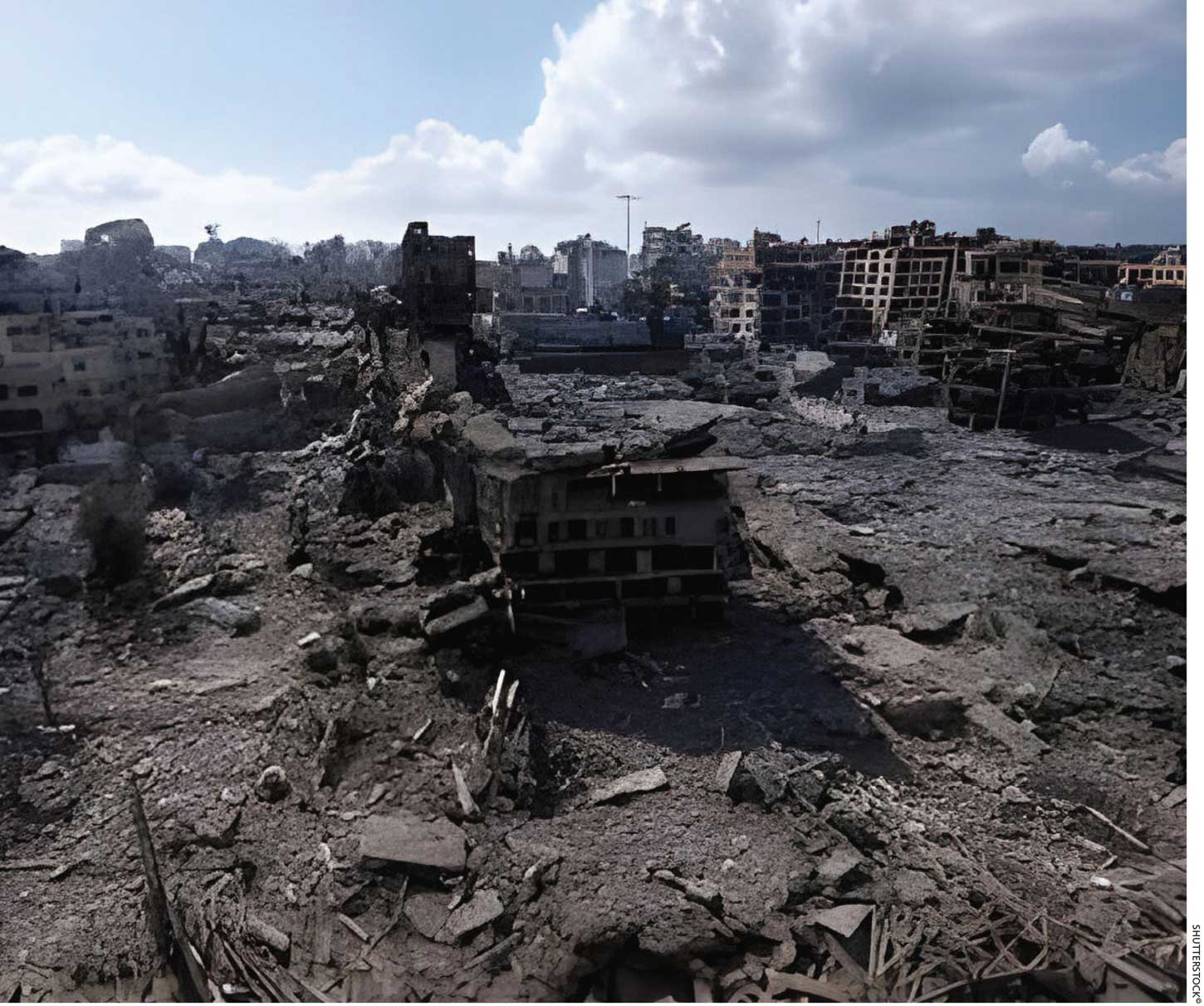
In Kampala, the president highlighted the need for NAM to reinvent itself and transform as a dynamic third bloc representing the Global South. Against this background, it is interesting that references to nonalignment as a framework for foreign policy have made a comeback in light of the revival of the collective interests of the Global South.
In their statements at the 19th NAM Summit and Summit of the South in Kampala earlier this year, President Ranil Wickremesinghe and Foreign Minister Ali Sabry highlighted the new challenges facing developing countries of NAM – including post-pandemic economic and debt crises, financing climate change transitions in energy and technology, equitable pandemic preparedness, food and energy security, achieving SDGs, bridging global digital and technological divides, and increasing military budgets including advanced WMD and nuclear arsenals.
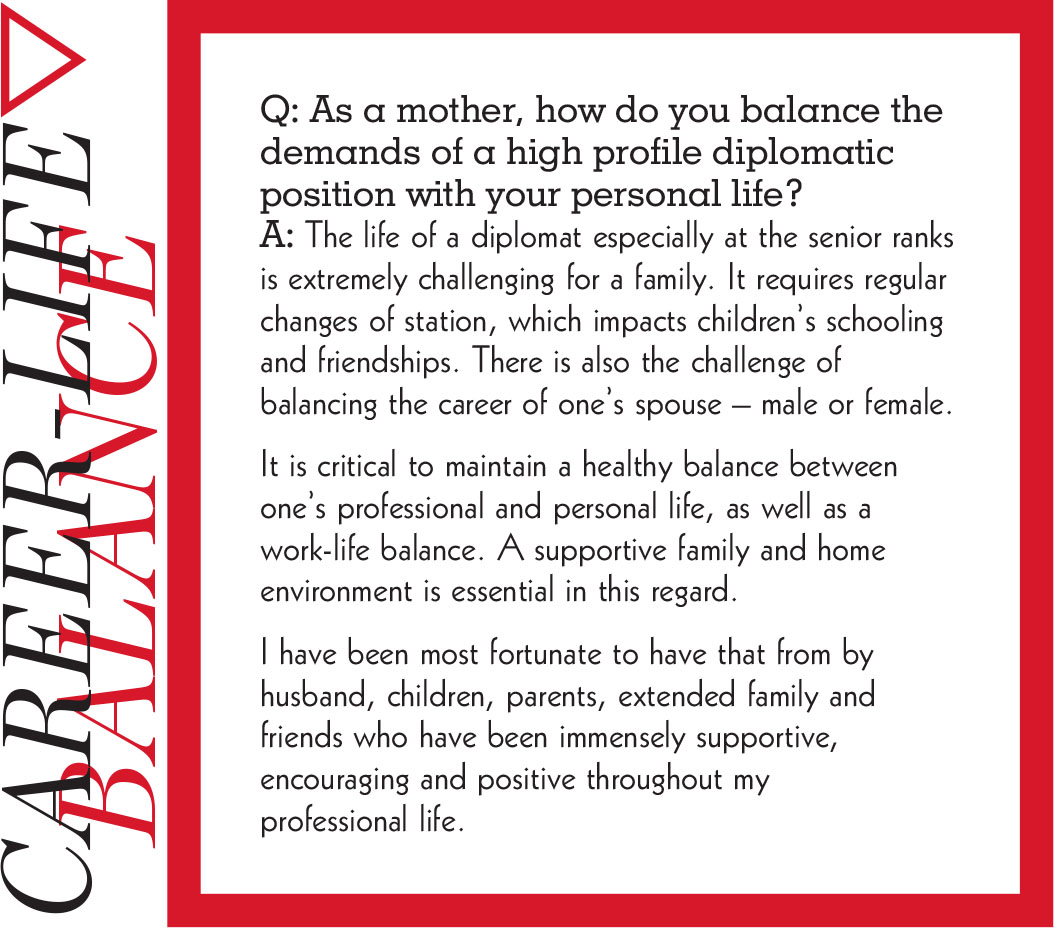
Sri Lanka has taken a leading role in these issues at relevant regional and multilateral fora.
Over the years, Sri Lanka has joined the voices of the now 120 Member States of NAM; and collectively, the movement has been successful in dismantling – both politically and legally – many of the formidable manifestations of injustices of colonisation, racism and apartheid, as well as establishing norms against destructive WMDs and non-proliferation of nuclear weapons.
Sri Lanka has been a consistent and active founding member of NAM since the Bandung Conference of 1955, which laid the foundation for the movement.
We have proactively participated in NAM meetings and advocated for its causes, and also hosted the 5th Summit of the Non-Aligned Movement in 1976. In addition, Sri Lanka led NAM to present a proposal to the UN General Assembly in 1971, proposing a zone of peace in the Indian Ocean against the backdrop of Cold War tensions – a proposal which has renewed relevance today.
Despite the past gains of the Non-Aligned Movement in dismantling situations of global injustice, the situation in Gaza highlights a glaring gap where NAM’s efforts for over 60 years have not yet been realised – i.e. the right to self-determination for the people of Palestine.
At the 19th NAM Summit, Sri Lanka’s president called for an immediate ceasefire and the creation of a State of Palestine in five years, on the basis of a two state solution, while also ensuring the security of Israel.
Moreover, Sri Lanka has set up a humanitarian fund for the victims of Gaza and pledged to contribute US$ 1 million towards this end. In New York City, Sri Lanka also chairs the committee that reports on Israeli practices in occupied Arab territories including Palestine.
Q: And last but not least, in this election year, what hopes do you have for Sri Lanka going forward?
A: In going forward, it is my hope that Sri Lanka will recover from the economic crisis, and grow to its full potential economically with justice and equity for its people.
It is also my hope that the social contract between the government and the people will be strengthened, leading to greater confidence in our democracy and representative government, reflecting the wishes and aspirations of all segments of the population including future generations.
And it is my hope that there will be reconciliation among the people with regard to the turbulence of the past and political consensus on key values of national relevance. I hope that both the government and people of Sri Lanka will learn from the past, in going forward in a manner that is socially, politically and economically sustainable.
And finally, it is my hope that Sri Lanka will regain its legitimate sovereign independent place in the world as a modern, advanced and influential nation, contributing to global harmony and progress in keeping not only with its interests but also the values of democracy, justice and equity, and international peace and harmony.


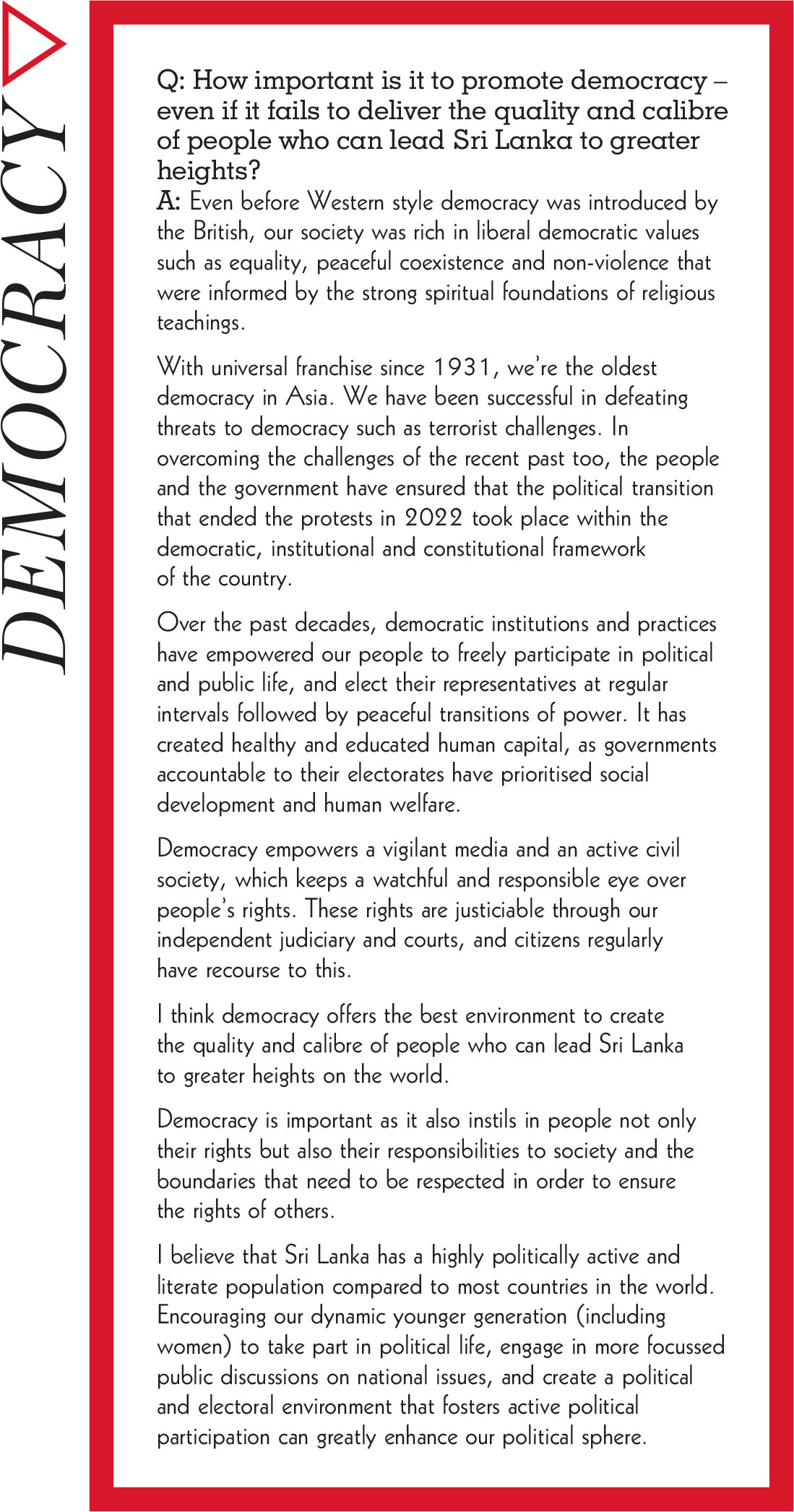
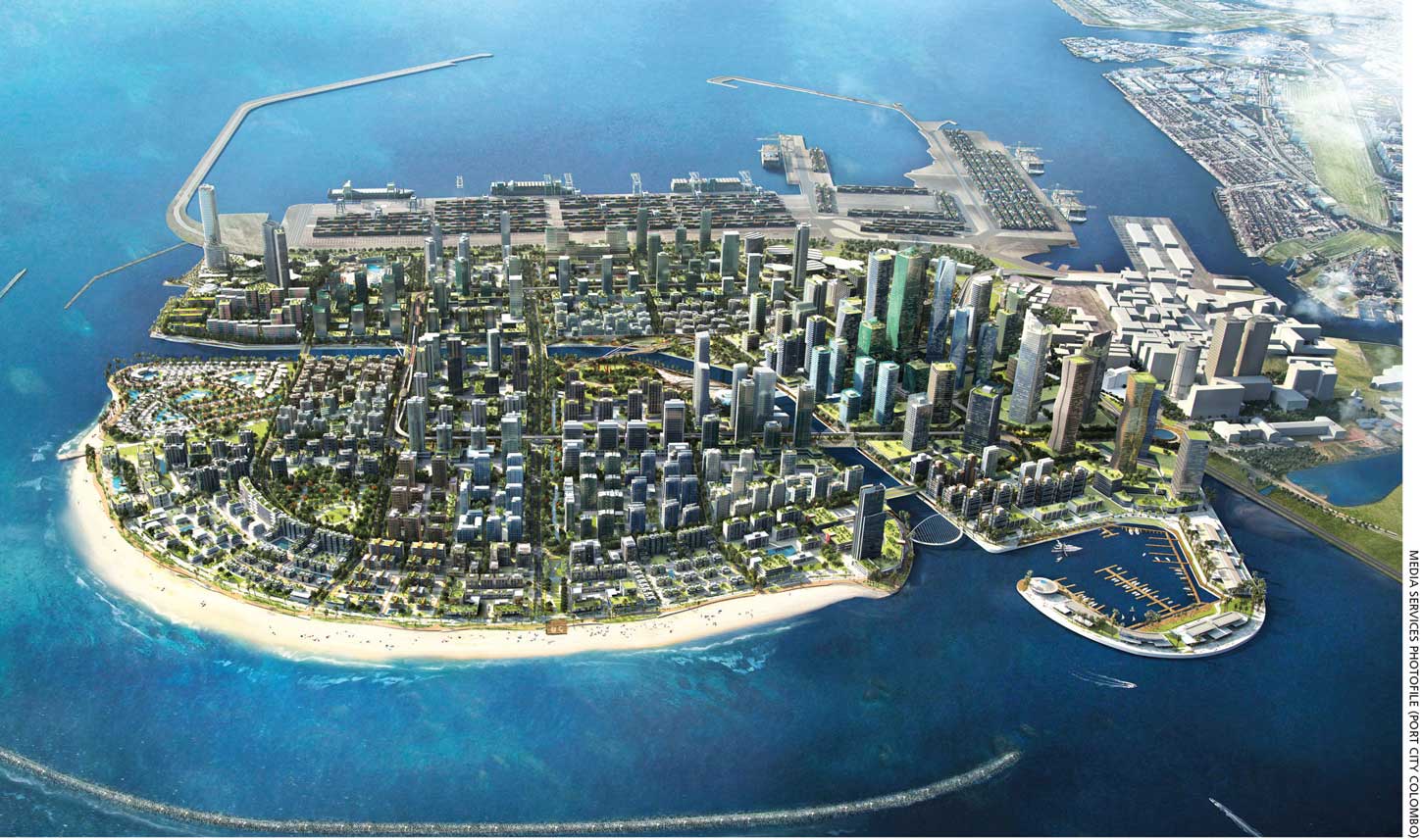
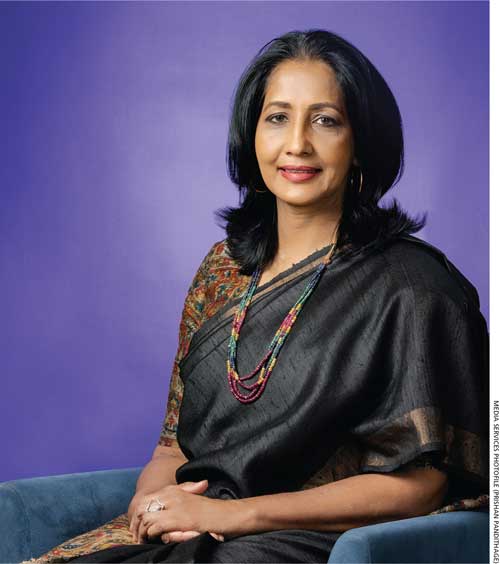





Leave a comment